The Results: Chatterkick X Revela Remote Work And Flexibility Survey
Businesses are approaching the workplace differently, thanks COVID-19! We've literally had to change our mindset on the things that we've learned to utilize to get better as a business; technology, communication, operating systems, safe physical spaces, stable sales environments, and flexible work opportunities. Our approach to these topics are being as COVID-19 is forcing us to dig deep into our businesses. As Revela and Chatterkick collaborate on a series of the Generation Social Media Podcast episodes, we wanted to hear honest feedback on remote work and flexibility. We sent out a 5-minute survey on remote work and flexibility during COVID-19, and the results were fascinating.
Biggest Takeaway: Employees are feeling disconnected from their employers and peers. It seems like most people are figuring out how to navigate remote work but are seeking connection and culture. This time at home has been an emotional rollercoaster; your team needs a morale booster while they are away. And they're ready to help lift you up when you call them to return to the office. They can't unlearn or unsee their personal growth and development while working remotely. Most people just want a hybrid option of being able to be flexible and remote when they need it. Still, they are looking forward to thriving in a connected, well-communicated organization.
We do not doubt that the aftermath of COVID-19 will be both challenging and rewarding. We promise we won't leave you hanging with these results. Beth and Michelle will be discussing these findings and how your organization can navigate what's next.
These results are presented to you by Chatterkick and Revela Group. Over 70 remote workers from the region completed the survey. These results are from a 6-day time period. The survey will continue to remain live; we plan to update the results as more submissions come in!

Survey Insights
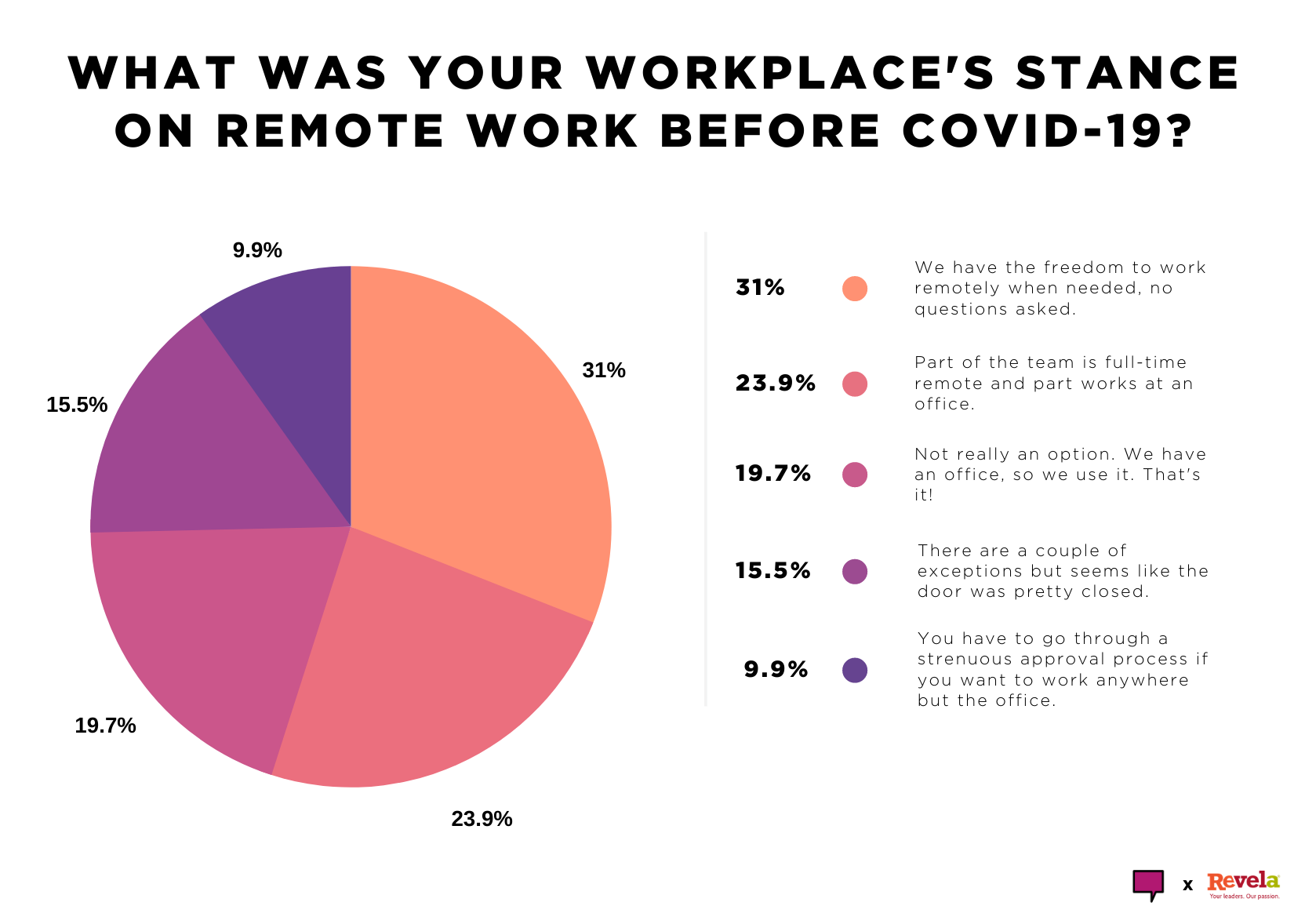
More than 50% of respondents had some form of familiarity with working remote before COVID-19.
Okay, let's set the scene on the "before COVID-19" outlook on remote work and flexibility. We were excited to see that a slight majority of businesses were already embracing the freedom to work remotely. The top 50% of respondents had some form of familiarity with working remotely. Is this the exception or the norm? Even though research suggests that work environments save money, boost morale, and attract top candidates, some businesses were firm on limiting or eliminating the idea all-together.
Here's an interesting find. There seems to be a lack of communication and understanding on remote and flexibility opportunities depending on employee's role level. All Executives, C-Suites and Business owners reported that their businesses embrace some level of remote/flexibility. While we didn't survey businesses in their entirety, that would be really interesting, there was a major discrepancy in the view from entry level and mid-career professionals. The majority of submissions at that level reported resistance and lack of remote/flexibility opportunities. Whether that's because businesses are being selective about those opportunities or not communicating is in the eye of the beholder.
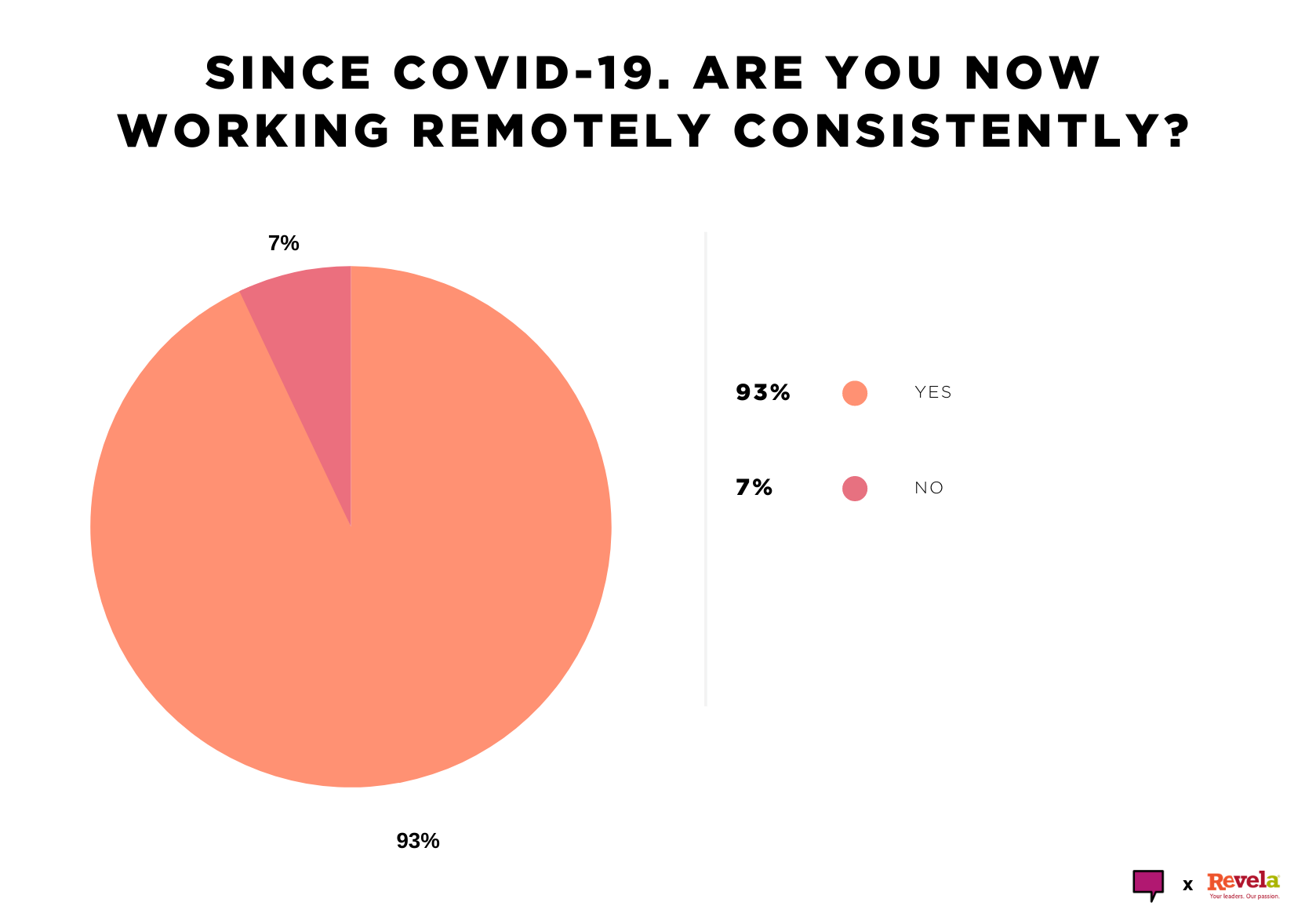
93% of survey respondents are working from home due to COVID-19.
Michelle describes this best in episode 021 of the Generation Social Media Podcast. Covid-19 challenged businesses' core beliefs around remote work and flexibility. They were forced to think about changing what success looks like in their business. In response, a vast majority of companies have adopted a remote work environment. 93% of our respondents are now consistently working in an isolated environment. What's important to remember here is that about half had some sort of familiarity with remote work-life whether they experienced working remotely or observed their co-workers in an isolated environment. Now, due to COVID-19, the remaining 38.1% had to find a new way of working, and fast! Some have had a positive experience, and some are ready to waltz right back into office-life. More on that coming up!
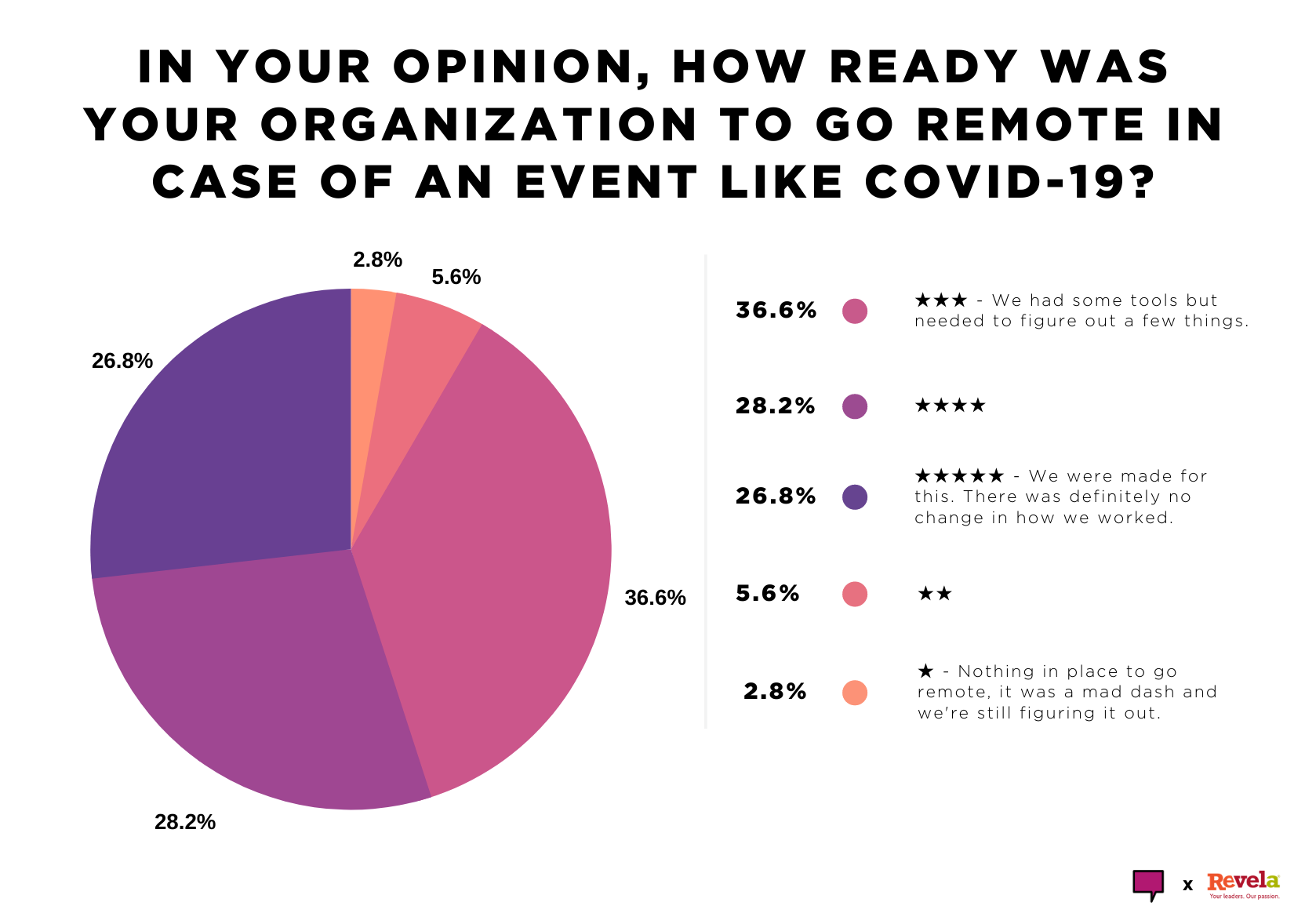
55% of businesses were more ready to go remote than the other 45%. The majority of respondents felt their organizations had some tools but still had to wing it.
With resistance comes fear and panic. Almost 45% of our overall submissions reported their businesses having a less than favorable outlook on working remotely, yet the majority of them were forced out of the office into their homes. When asked how ready organizations were to go remote in case of an event like COVID-19, the majority found their organizations somewhere in the middle. They had some tools and structures in place but still operating on the fly. We were excited to see that even though the 45% were maybe resistant to remote work, they seemed to innovate quickly and lean into the new way of doing business. Only 8.4% of respondents felt like their organizations were not ready.
Here's an interesting find. We broke out results from the top-tier leaders and the entry level/mid-career answers and their average answer was 4/5 stars. There seemed to be a positive outlook on organization's capabilities to go remote both from key-decision makers and those on the frontlines.
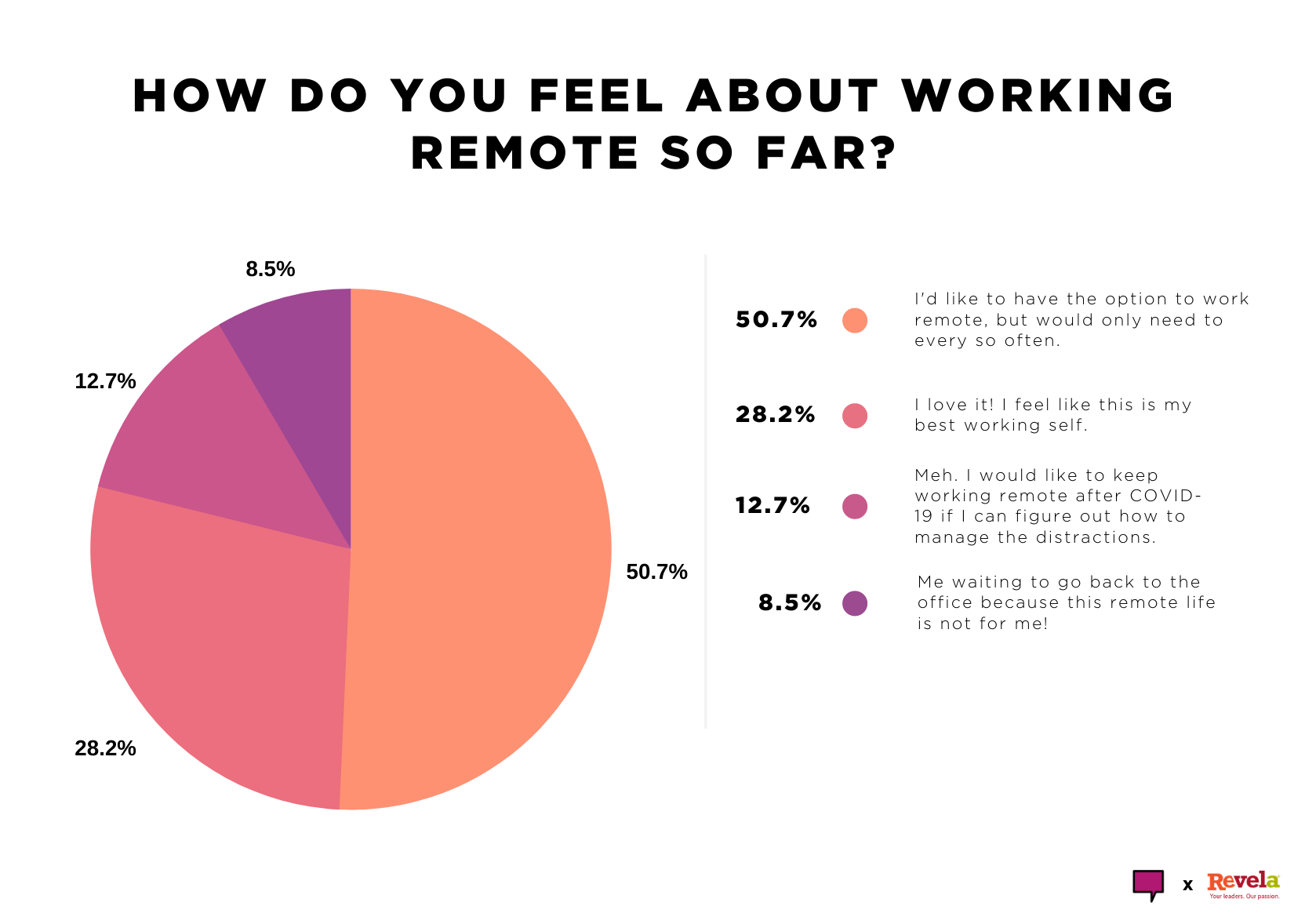
50.7% would love to incorporate the option to work remotely in the future, but not permanently!
The allure of working remote has always been a hot topic, and not just for young employees. COVID-19 did allow employees to see if the grass is greener on the other side. It turns out, people enjoyed but, being forced into 100% remote lifestyle didn't appease the majority. Only 28.2% respondents fully embraced the remote lifestyle and found their best working habits. On the flip side, 8.5% of respondents discovered that the remote working grass is actually really brown and not appealing at all.
Here's an interesting find. Both decision-makers and entry level/mid-career professionals agreed on the option to work remote every so often. There was full agreement on this question, which is kind of surprising. Seems like mid-level employees have different views on 100% remote/flexible environments.
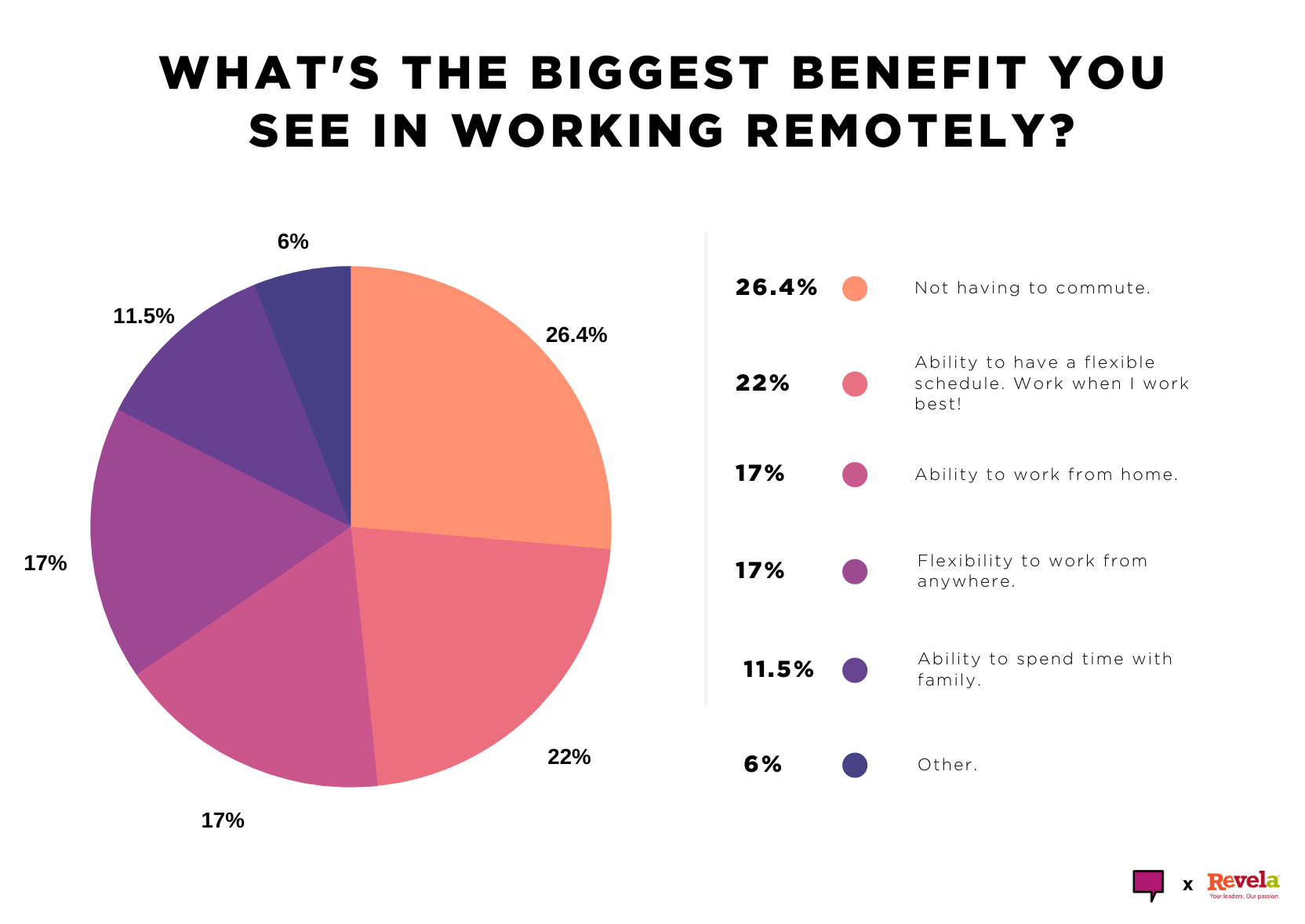
56% of answers on the biggest benefit of remote work focus on flexibility; Flexibility both on hours and physical environment. Everyone agrees commuting sucks. 🤣
This is my favorite question. I love seeing having some insight into what's fueling people's new work-at-home energy. On this question, we let respondents select as many options that applied to them. Turns out, people really just hate driving or commuting to work! lol That answer had 48 responses! People are really embracing flexible scheduling and discovering their best work environments. COVID-19 provided a cover for employees to lean into self-awareness, and that's not an easy feat.
Here's an interesting find. Decision-makers and entry level/mid-career professionals only disagreed on two questions and this is one of them. Decision-makers were hands down digging the benefit of working when they work best (flexible schedules). Entry level/mid-career professionals leaned more towards the benefit of not commuting.
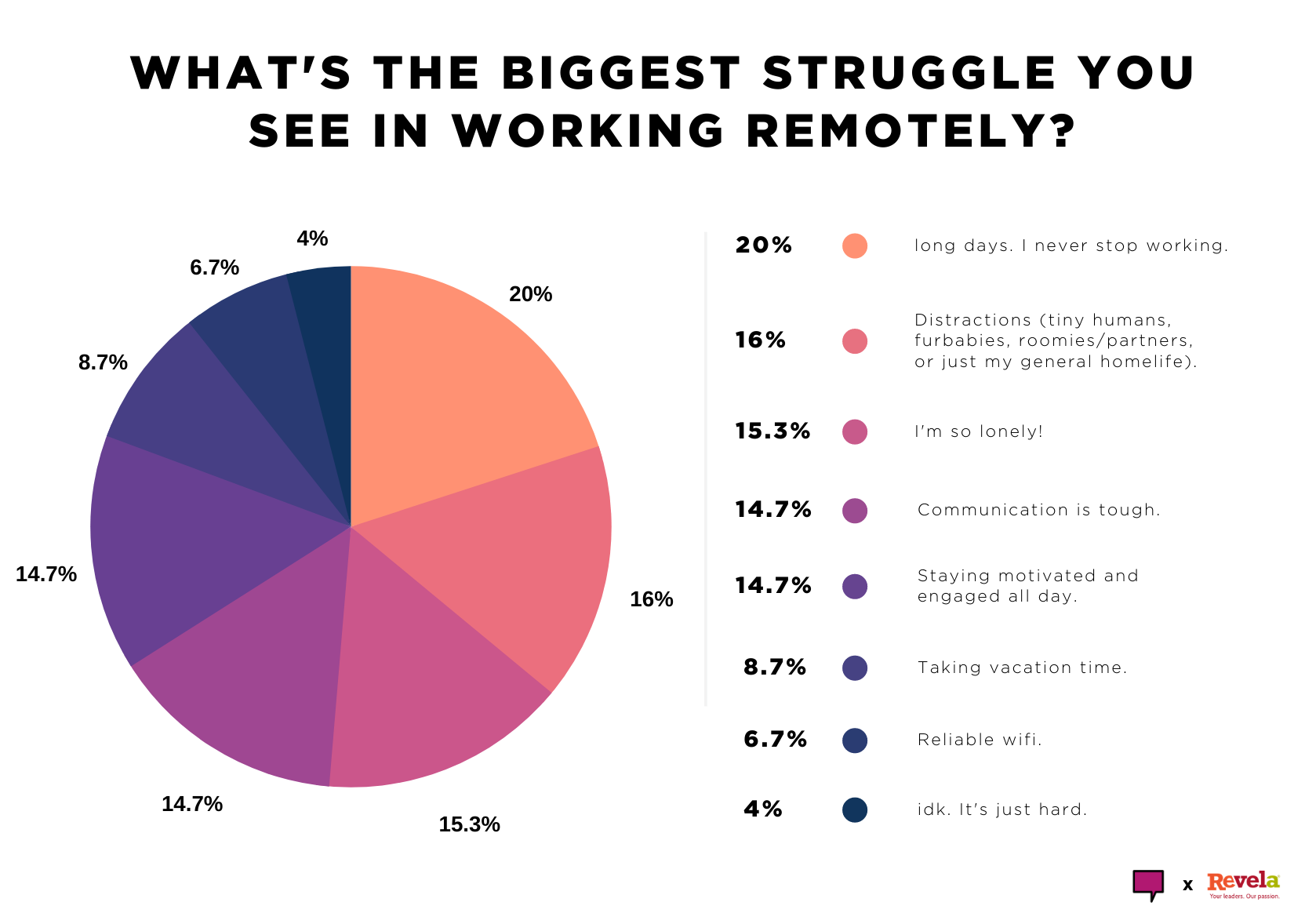
Overachievers are burned out, and others are distracted, but answers on struggles on remote work environments are personal. The results are all over the board!
The negative stigma around remote work typically circulates around crappy productivity, losing peer connections and culture, cybersecurity and technology problems, and lack of control. What we saw from the survey is that the reality of remote struggles is much more personal than businesses' fears. Some people are even putting in way more effort and time than they ever were in the office. And only 6.7% were having real technical difficulties. The peer connections and culture is a real struggle that I think businesses need to pay attention to. We see this topic reaffirmed in a question on what companies can do to make it better.
Here's an interesting find. I have to be honest, I don't really know how to read this. It is interesting. This is the second question where execs/c-suites/owners differ from entry level/mid-career professionals. Executives say the biggest struggle is taking vacation time. Entry level professionals say their biggest struggles are distractions. Tweet us your opinion on this.
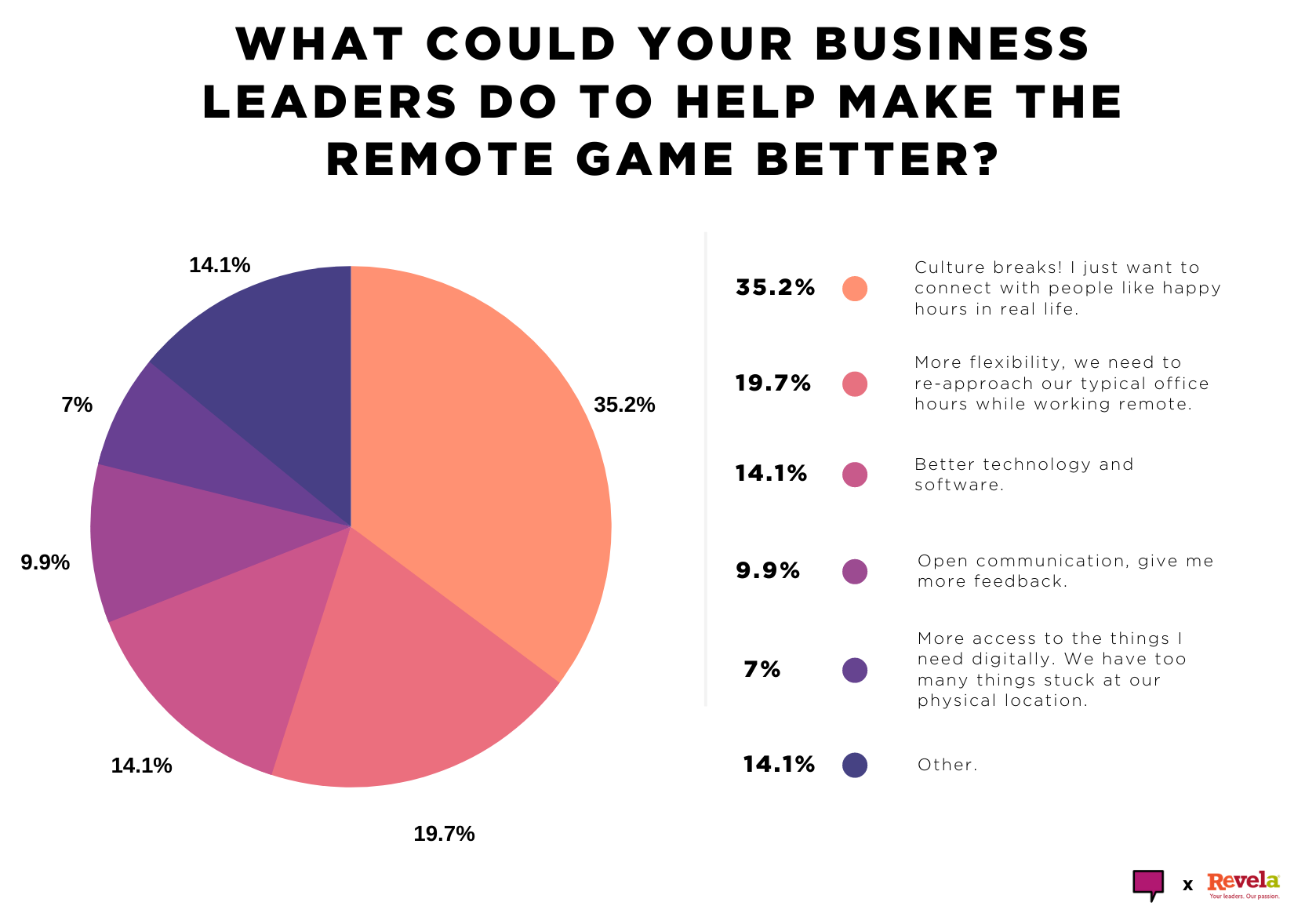
35.2% just want to connect with their peers, and they want your help doing it. Culture for the win!
Okay, I did NOT see this coming. Chatterkick has an extraordinary culture of connection, transparency, and light-heartedness. We have witnessed buy-in from our team members at an all-time high when we commit to building and cultivating our culture. With that being said, I fully expected these answers to be 90% communication and more support. I'm happy to say that I was wrong. It turns out 54.9% of the respondents are looking for connection and understanding! Employees want to feel supported. We hear it all of the time, but the Maya Angelou quote has never been more true.
"I've learned that people will forget what you said, people will forget what you did, but people will never forget how you made them feel."
We'll be sharing more ideas on how to embrace this on the next Generation Social Media Podcast episode. But I can let you in on a secret event we have coming up at the Chatterkick office! We're partnering with Hawks Coffee Shop to do a team-wide trivia afternoon with prizes, drinks, snacks, and all fun. We're unplugging for the afternoon and just connecting.
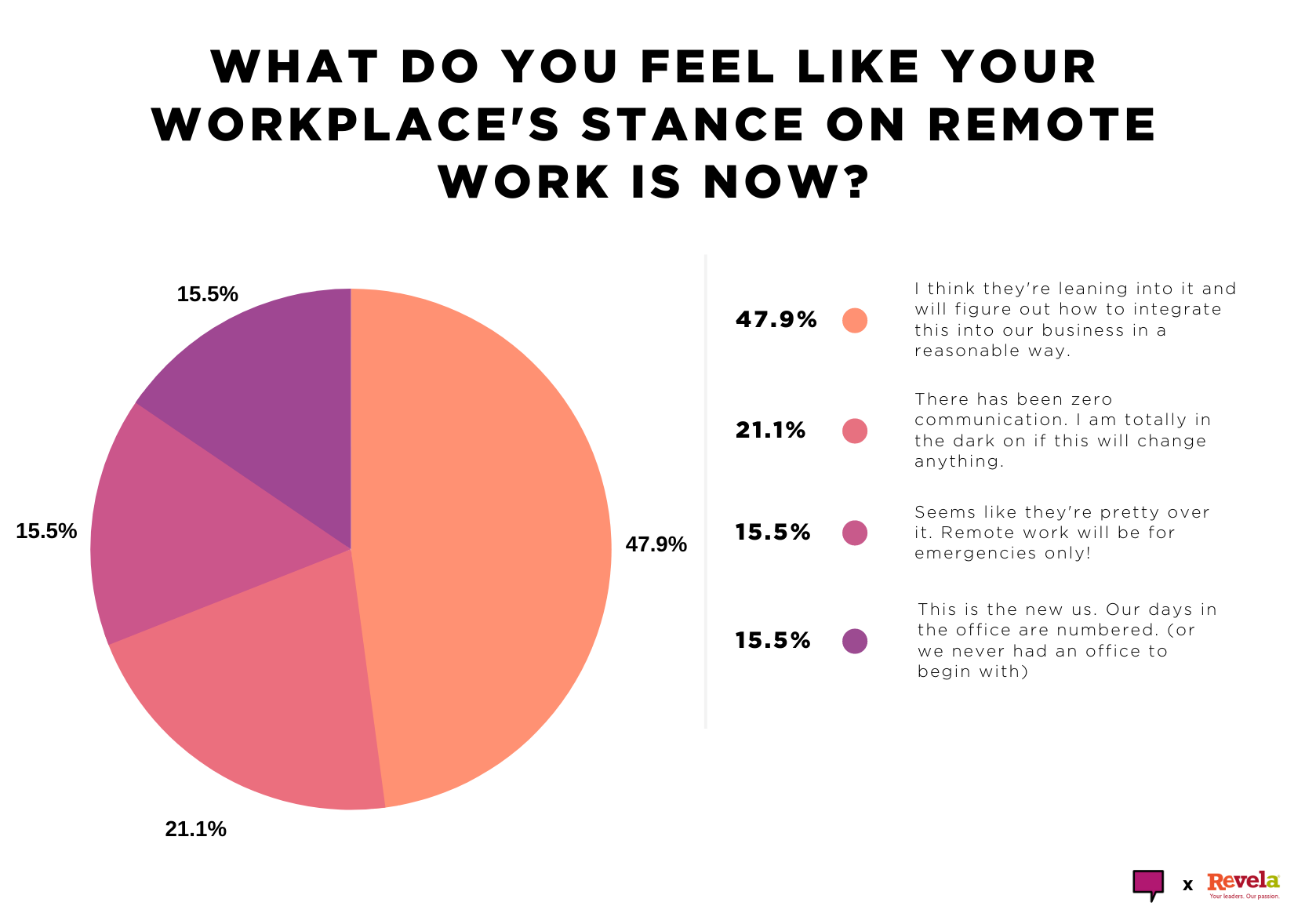
21.1% are still in the dark on what their employer's intention and plans are during COVID-19! 😲
We don't want to brush by the top results here; we're excited about the 47.9% of businesses that are embracing this new normal. What's concerning about these answers is that it's SO important to increase transparency and be more proactive on communication as possible right now. Everything is changing at such a rapid pace; you need to eliminate assumptions and be open to your team so that they can believe in the best intentions in your business, just like you need to believe in theirs.
Here's an interesting find. Decision-makers and entry level/mid-career professionals are in kahoots on this answer.
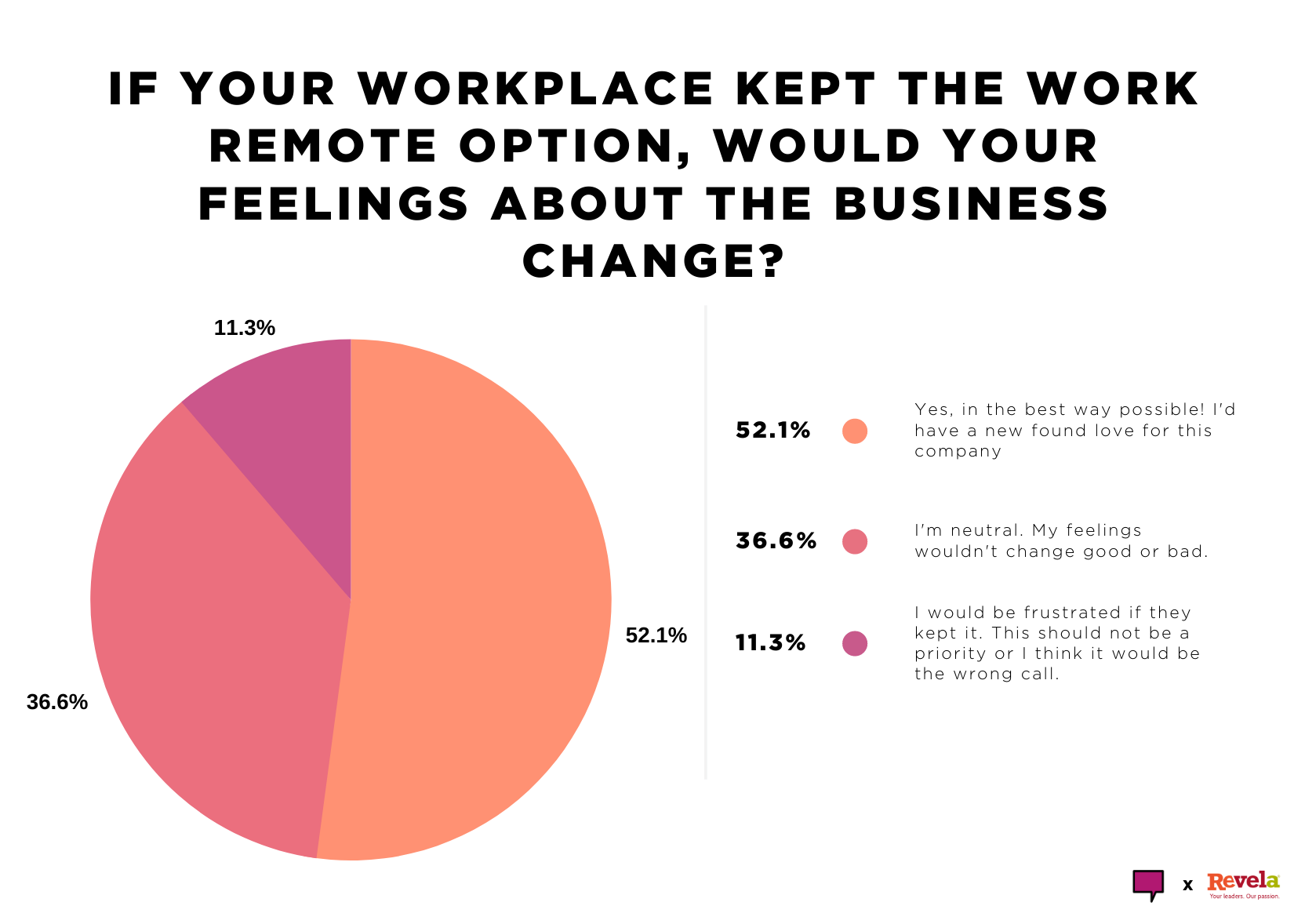
52.1% of respondents would have a new found love for your company if you embraced some level of remote work and flexibility. Only 11.3% negative nancy's vote no to remote work life.
Okay, that last sentence sounds super judgy, I'm sure they have a reason for not embracing this new work life. Employees are reporting greater productivity and higher job satisfaction, what a win for employers. The next step in this, the aftermath of COVID-19 is going to be challenging to navigate. That's why we're keeping the conversation going between Chatterkick and Revela. Keep an eye, or ear rather, to the podcast for new solutions in upcoming episodes.
Forbes shifts the conversation from remote vs. in-office to harmonizing workspaces, communications, and result-based tracking in a superstorm of benefits for both employees and employers.
Here's an interesting find. Decision-makers and entry level/mid-career professionals are in kahoots on this answer. They both felt like this would be a positive move for organizations and would have a new found love for the company. ❤️
Audience Insights
The more insights you have, the better equipped you are to understand the perspective on the results! We asked three demographic qualifying questions for this survey. I would have LOVED for more demographic deets on this project, but we also wanted to get this survey out since the topic is so relevant. Here's what we know about the respondents.
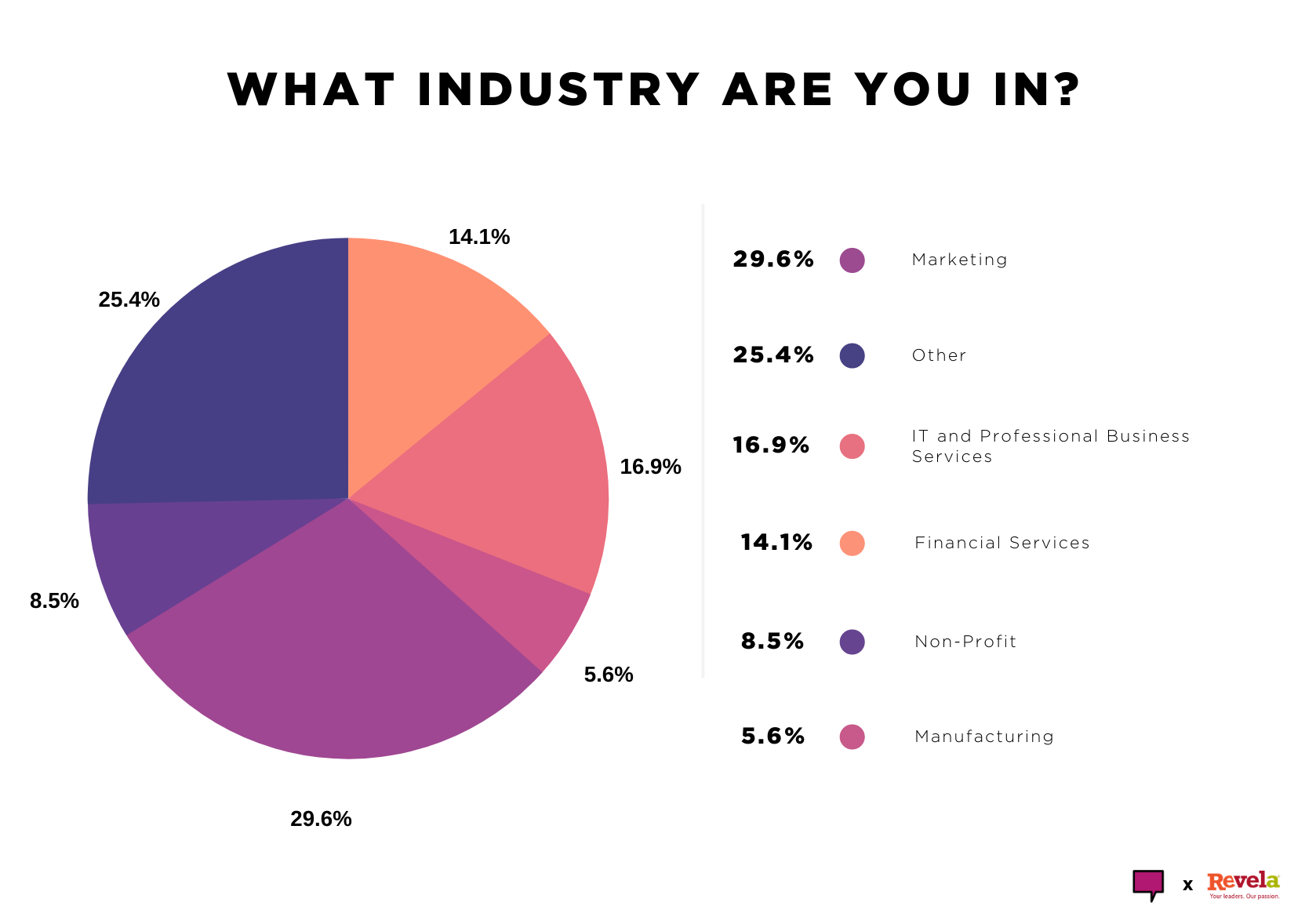
Surprise! The majority of the submissions were people in the marketing industry. It's probably not all that surprising. I do want to explain the "other" category. To simplify the visual-data, we grouped industries that had three or fewer submissions. This group is made up of Software, Travel & Tourism, Health Care, Consumer Products, eCommerce, Government, Insurance, Real Estate, Education, and Consulting.
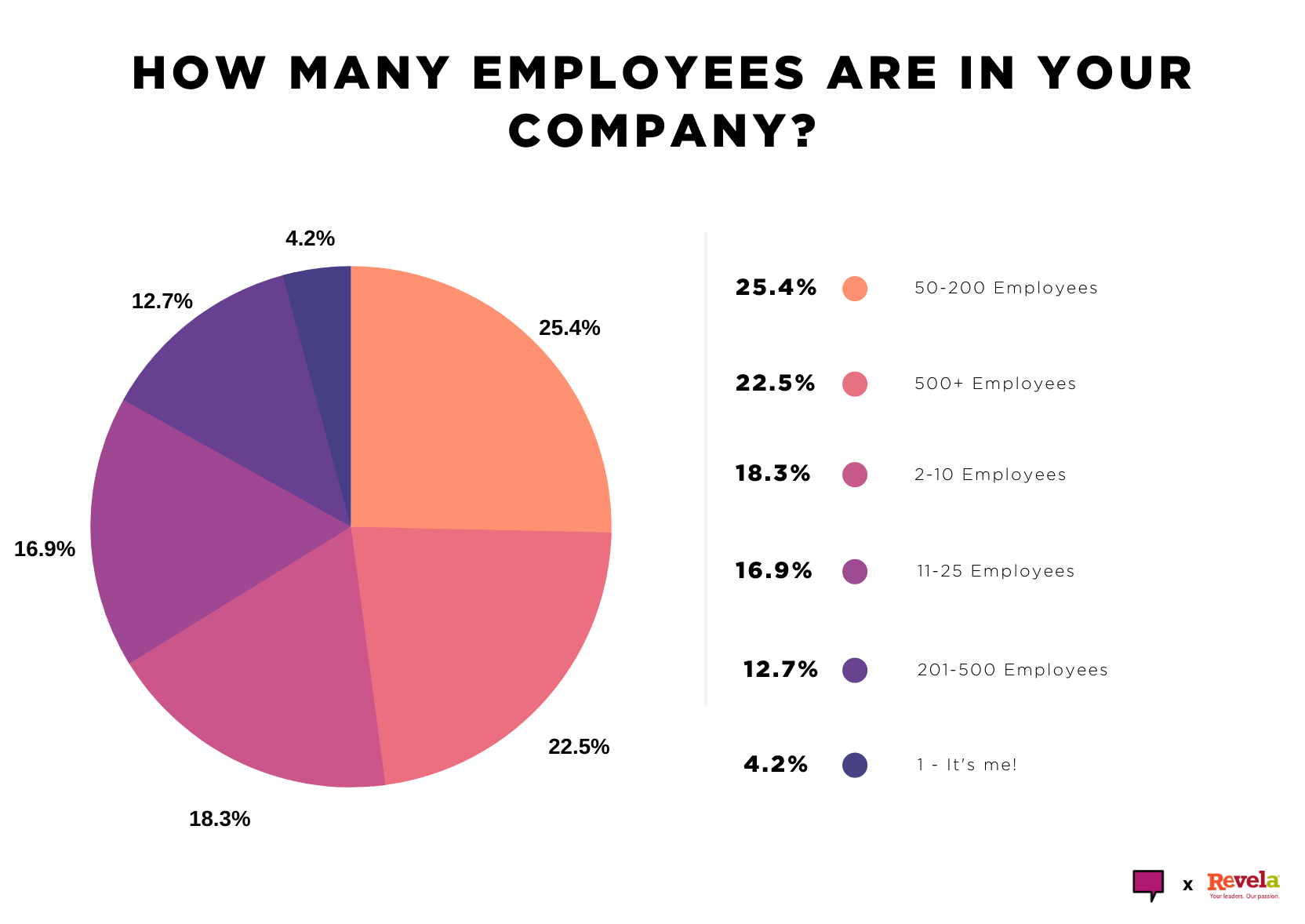
Okay, I need to be super transparent here. Remember when I said I was "rushing" this survey out to the public? I made a "researcher whoopsie." I did not notice that we missed a group of employees from 25-50 until after the survey was live, which was an oversight! Overall, I was impressed with the mix of businesses that completed the study.
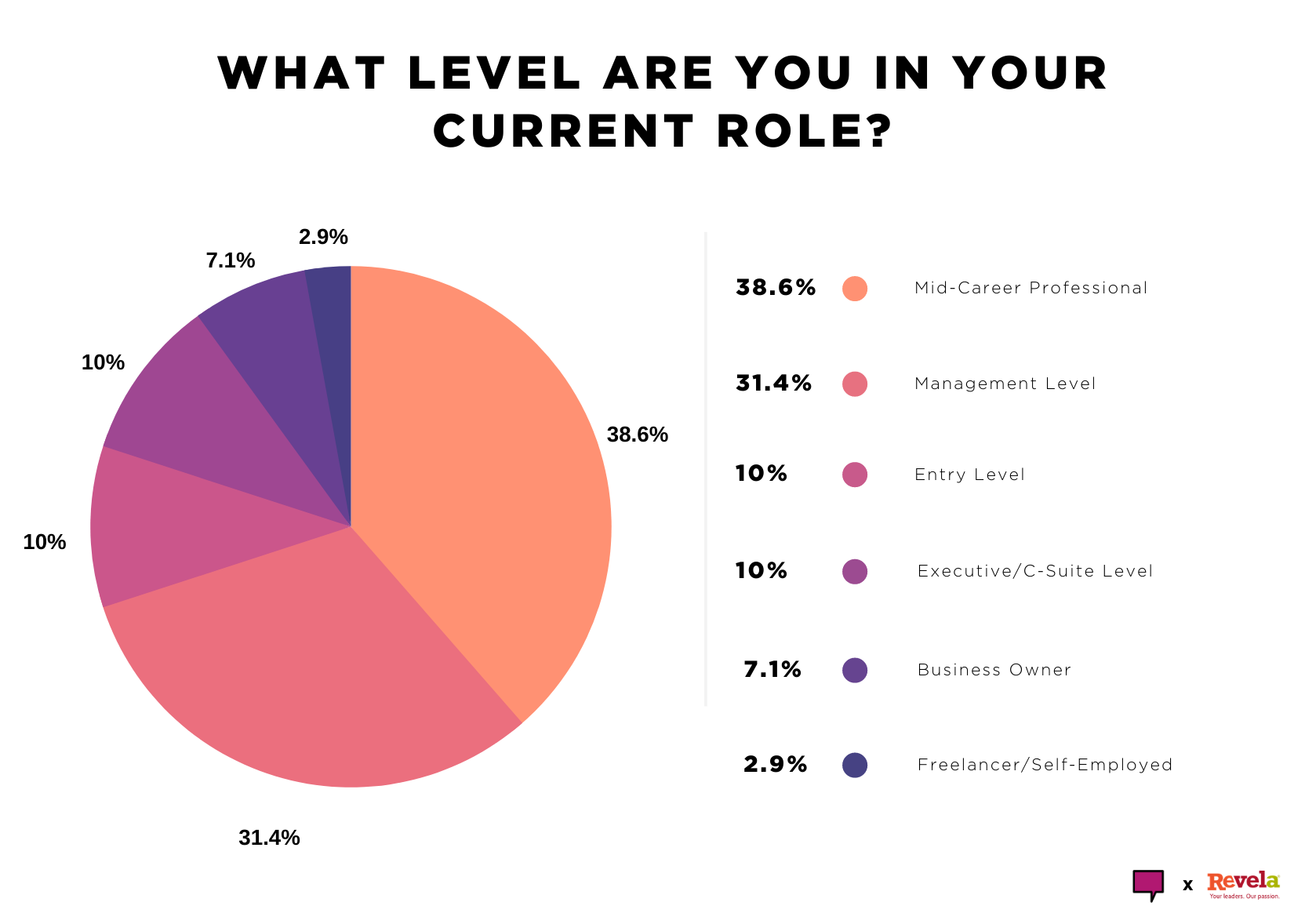
All of the roles had fairly consistent answers to the surveys, but we dove a little deeper on the differentiation between Executives and Business Owners' responses vs. Entry Level and Mid-Career Professionals. They actually agreed on most topics but two. We're just going to leave this here, you read into this how you see fit. Executives/C-Suite Level and Business Owners appreciated the benefit of breaking their typical 8-5 day and having more flexibility on when they work. Where they struggle with remote work is the inability to take vacation time. On the other side, Entry Level and Mid-Career Professionals enjoyed not having to commute to work. Their struggle with remote work stems from distractions in the form of tiny humans, furbabies, roomies/partners, or just general home life. More on the similarities of each question!


